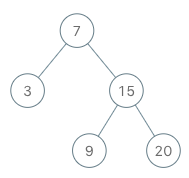Tree - 173. Binary Search Tree Iterator
173. Binary Search Tree Iterator
Implement an iterator over a binary search tree (BST). Your iterator will be initialized with the root node of a BST.
Calling next() will return the next smallest number in the BST.
Example:

BSTIterator iterator = new BSTIterator(root);
iterator.next(); // return 3
iterator.next(); // return 7
iterator.hasNext(); // return true
iterator.next(); // return 9
iterator.hasNext(); // return true
iterator.next(); // return 15
iterator.hasNext(); // return true
iterator.next(); // return 20
iterator.hasNext(); // return false
思路:
题目要求写一个bst的迭代器,实现两个接口,输出树中目前最小的值,和树中目前有没有下一个节点。仔细分析会发现,由于bst的根节点比左边的大比右边的小,要从小到达输出,明显就是中序遍历来做这道题,这里采用容器list来当stack,当然也可以自己使用切片和一个栈顶指针来实现一个栈。
代码:
go:
/**
* Definition for a binary tree node.
* type TreeNode struct {
* Val int
* Left *TreeNode
* Right *TreeNode
* }
*/
type BSTIterator struct {
Stack *list.List
}
func Constructor(root *TreeNode) BSTIterator {
bsti := BSTIterator{Stack:list.New()}
bsti.push(root)
return bsti
}
/** @return the next smallest number */
func (this *BSTIterator) Next() int {
e := this.Stack.Back()
cur := e.Value.(*TreeNode)
this.Stack.Remove(e)
this.push(cur.Right)
return cur.Val
}
/** @return whether we have a next smallest number */
func (this *BSTIterator) HasNext() bool {
return this.Stack.Len() != 0
}
func (this *BSTIterator) push(node *TreeNode) {
for node != nil {
this.Stack.PushBack(node)
node = node.Left
}
}
/**
* Your BSTIterator object will be instantiated and called as such:
* obj := Constructor(root);
* param_1 := obj.Next();
* param_2 := obj.HasNext();
*/